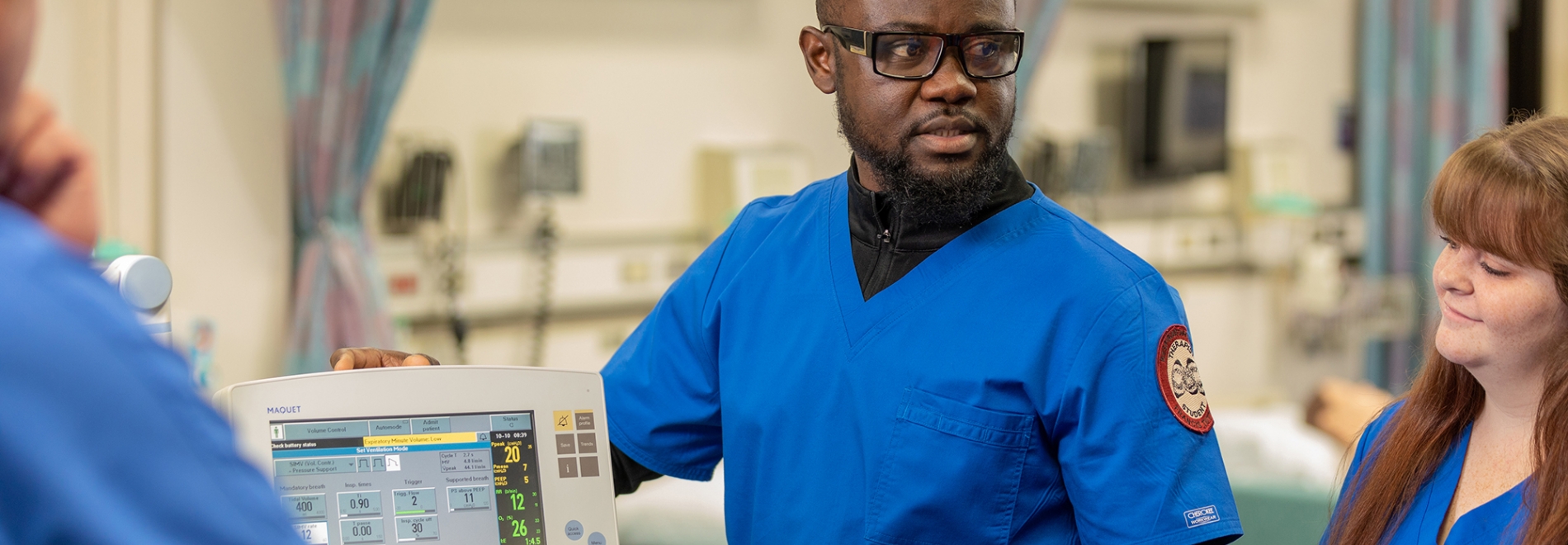
Respiratory Care Therapist
The respiratory care industry is in high demand! Start here to earn nationally recognized credentials and a rewarding career!
Respiratory care therapists work in various medical environments, such as hospitals, pediatric/neonatal care units, skilled nursing, and rehabilitation facilities. As a certified respiratory therapist, you will help treat critically ill patients and provide valuable life-changing information to them and their families.
Respiratory therapists are trained to analyze data, evaluate patients, and make critical thinking decisions that directly affect the well-being of patients. They work directly with patients, use valuable information to understand trends, and advise on how chronically ill individuals can improve their breathing.
Respiratory Care Application Packet
Training takes place in state-of-the-art laboratory spaces using the same tools and machines as modern professionals. Our respiratory therapist classes will show you how to:
- Evaluate patients and consult with physicians to recommend a change in therapy
- Perform physical assessments to analyze breathing sounds and measure vital signs
- Draw blood to determine levels of oxygenation and ventilation
- Manage ventilator care, intubation and placement of artificial airways
- Respond to emergency situations and urgent calls for patient care
Accreditation
The Respiratory Care Program, CoARC 200454, located on the Francis Tuttle Technology Center campus, in partnership with Oklahoma City Community College, grants an Associate in Applied Science Degree in Respiratory Care and is accredited by the Commission on Accreditation for Respiratory Care (www.coarc.com).
CoARC accredits respiratory therapy education programs in the United States. To achieve this end, it utilizes an ‘outcomes based’ process. Programmatic outcomes are performance indicators that reflect the extent to which the educational goals of the program are achieved and by which program effectiveness is documented.
Programmatic outcomes from the most recent Annual Report of Current Status.
Respiratory Therapy Professional Licensure Disclosure
Program Goals and Standards
To prepare graduates with demonstrated competence in the cognitive (knowledge), psychomotor (skills), and affective (behavior) learning domains of respiratory care practice as performed by respiratory therapists.
Respiratory Care Therapist Majors
About this Occupation
Respiratory Care Practitioners (RCP’s) work in an extremely busy environment and deal with critically ill patients and their families. They must be able to work effectively as part of a multidisciplinary team and must be able to communicate effectively with team members, patients, and families, even under stressful conditions. Respiratory Therapists must have the ability to analyze data, evaluate patients, and make critical thinking decisions that directly affect their patients’ well-being. To perform necessary job functions, Respiratory Care Practitioners must have visual acuity sufficient to read monitors from a distance of 6 to 8 feet and to observe and assess patients. They must also be able to read patient charts and small print on laboratory reports, medication containers, and technical manuals. In addition, they must have auditory acuity sufficient to accurately assess heart and breath sounds, understand instructions in a normal tone of voice without seeing the speaker's face, and hear and respond to audible alarms. When working in this field, steady physical activity is required and may consist of walking, standing, and assisting in moving patients and/or equipment. Daily tasks require occasional lifting up to 30-40 lbs. When dealing with patient care there is occasional to frequent exposure to communicable disease, and direct contact with blood or other bodily fluids requires that personal protective equipment be worn in these circumstances.